poetry
Archived Posts from this Category
Archived Posts from this Category
Posted by ben on 19 Jan 2009 | Tagged as: poetry, politics, public art
Jim Fisher, discussing the challenges Elizabeth Alexander faces in writing an occasional poem for the inauguration, explains why this kind of poetry doesn’t usually work:
Why is poetry so different from other disciplines? Music and the plastic arts (painting, sculpture, architecture) are demonstrably receptive to commissions, with great works created on command, as it were. With sculptures and buildings, we only have to walk a few downtown blocks in most major cities to see lasting examples of both, pro and con.
The problem for poets is not the commission — Milton’s “Lycidas” and Marvell’s “Upon Appleton House” are both immortal poetry commissions — but the occasion, which fixes the poem with a public event. Once the function has passed, the poem loses the immediacy of its audience, and with it the power to summon meaning and emotion over time.
So let’s dispense with this idea that poets can produce lasting poems for public events. It’s unfair to the audience, discomposes the poet, and probably confirms the low opinion of poetry some listeners already hold.
When we read poetry to ourselves, the occasion of a great poem is an internal event, organizing the perceptions and determining the material. When that occasion is a point in time and place, the work is more likely to be stuck there when published: partial, responsible, contemporary, rarely timeless.
[hat tip]
Posted by ben on 15 Dec 2008 | Tagged as: performance art, poetry, r.i.p., wordy
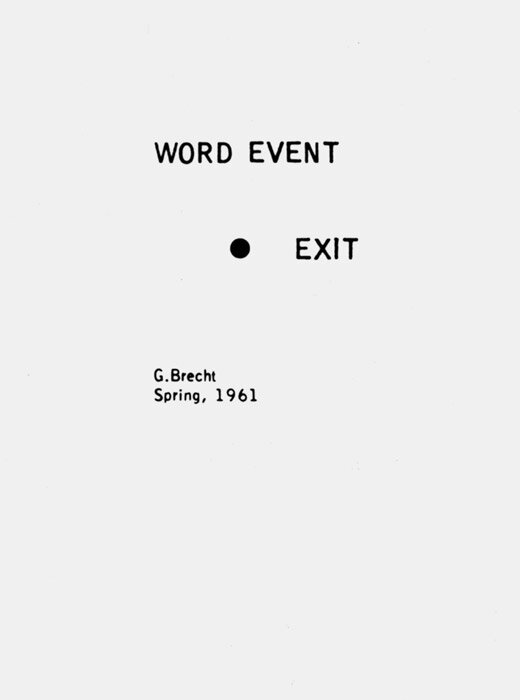
Word Event (George Brecht, 1961)
In their use of language as a device to cut into the evanescent everyday, [George] Brecht’s “insignificant and silly gestures” open an infinite universe of possibilities, just as [La Monte] Young’s precise operations move into the zones of the minimal and the series, of the same but inevitably different because virtually interminably—the line or the sound would go on in some sense “forever.” In both, the event is pared down to a minimum: a simple, basic structure that can be endlessly reenacted and reinscribed in new contexts, different in each instance and yet retaining a certain coherence. Inevitably calling to mind Lawrence Weiner’s highly condensed and yet generalizable “statements,” Brecht’s and Young’s most interesting scores reduce language to a kind of object, but also establish it as a kind of repeatable, replaceable structure, open to unlimited, unforeseeable realizations.
— Liz Kotz,
Posted by ben on 17 Aug 2008 | Tagged as: poetry, wordy
A Man of Words
His case inspires interest
But little sympathy; it is smaller
Than at first appeared. Does the first nettle
Make any difference as what grows
Becomes a skit? Three sides enclosed,
The fourth open to a wash of the weather,
Exits and entrances, gestures theatrically meant
To punctuate like doubled-over weeds as
The garden fills up with snow?
Ah, but this would have been another, quite other
Entertainment, not the metallic taste
In my mouth as I look away, density black as gunpowder
In the angles where the grass writing goes on,
Rose-red in unexpected places like the pressure
Of fingers on a book suddenly snapped shut.
Those tangled versions of the truth are
Combed out, the snarls ripped out
And spread around. Behind the mask
Is still a continental appreciation
Of what is fine, rarely appears and when it does is already
Dying on the breeze that brought it to the threshold
Of speech. The story worn out from telling.
All diaries are alike, clear and cold, with
The outlook for continued cold. They are placed
Horizontal, parallel to the earth,
Like the unencumbering dead. Just time to reread this
And the past slips through your fingers, wishing you were there.
– John Ashbery (from )
Posted by ben on 01 Aug 2008 | Tagged as: books, graffiti, outsider, poetry, vs.
There is a Jewish proverb which says that “the other’s material needs are my spiritual needs;” it is this disproportion, or asymmetry, that characterizes the ethical refusal of the first truth of ontology–the struggle to be.
… The ethical situation is a human situation, beyond human nature, in which the idea of God comes to mind. In this respect, we could say that God is the other who turns our nature inside out, who calls our ontological will-to-be into question.
Jesus
Others
You!
Posted by ben on 26 Jul 2008 | Tagged as: graffiti, in yo face, outsider, poetry, politics, public art
I’ve noticed this one for months (years?) on the access road to I-10:

Also, a followup on Justin’s great street art find from a couple months ago. Apparently this is by the same artist (it’s in the men’s bathroom at the Voodoo Lounge, aka SWC Club):
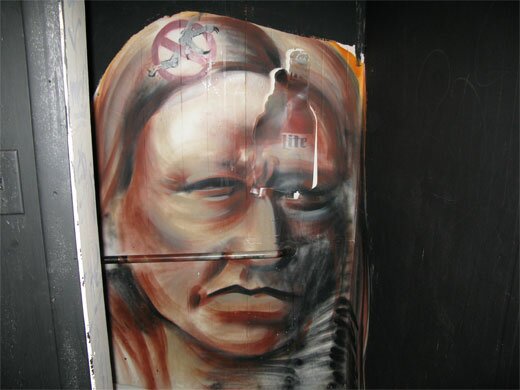
Posted by ben on 21 Apr 2008 | Tagged as: adventure day, essays, poetry
Yesterday the Washington Post published a little reflection by Edward Hirsch on the connection between walking and poetry [hat tip]. He threads his own poetic footsteps with those of Baudelaire, Frost, Blake, and a host of others. The piece has an interesting resonance with a lecture Hirsch gave last year at Trinity University, in which he compares the act of reading to pulling a message from a bottle drifting in the sea. We can see him wandering along the beach, gathering the bottles tossed into the waves by poets on distant shores; and to stretch the metaphor further, uncorking a missive sent through the oceanic postal system of memory by the nascent poet in an 8-year-old Edward Hirsch.
Mostly, though, this discussion of long, poetic walks reminds me of Julio Cortazar’s Hopscotch. The opening passage introduces lovers who wander the streets of Paris, dating by chance:
Would I find La Maga? Most of the time it was just a case of my putting in an appearance, going along the Rue de Seine to the arch leading into the Quai de Conti, and I would see her slender form against the olive-ashen light which floats along the river as she crossed back and forth on the Pont des Arts, or leaned over the iron rail looking at the water. It was quite natural for me to climb the steps to the bridge, go into its narrowness and over to where La Maga stood. She would smile and show no surprise, convinced as she was, the same as I, that casual meetings are apt to be just the opposite, and that people who make dates are the same kind who need lines on their writing paper, or who always squeeze up from the bottom on a tube of toothpaste.
Posted by ben on 16 Apr 2008 | Tagged as: acquisitions, design, poetry
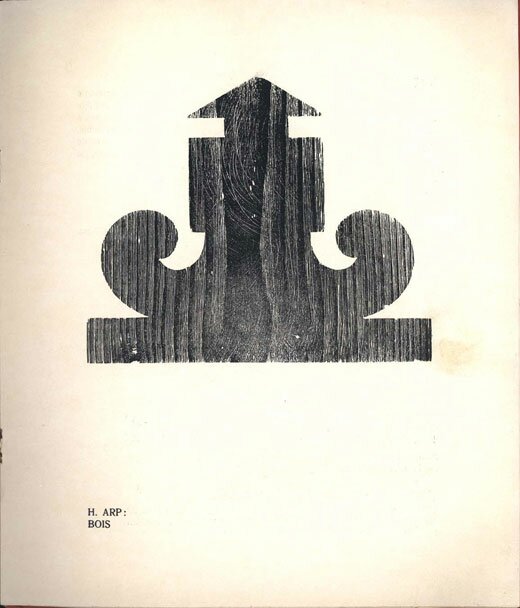
UbuWeb recently posted issues 1-3 of Tristan Tzara’s Dada magazine, which ran from 1917 to 1919. Unfortunately, they didn’t post the final, combined issue 4-5, which features some important works by Picabia, as well as Arp, Breton, Cocteau, and Radiguet. Still, a great little contribution to UbuWeb’s amazing archive.
Posted by ben on 31 Mar 2008 | Tagged as: design, net.art, photography, poetry, politics
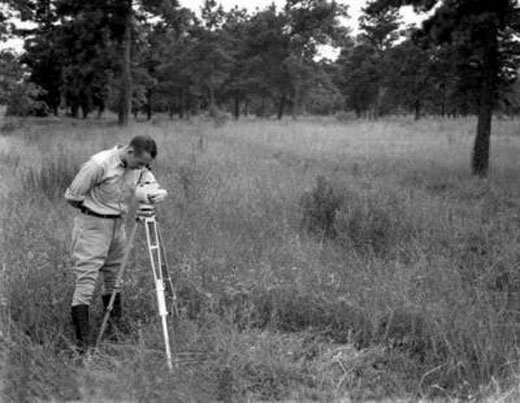
is a new blog by an old friend and occasional collaborator, publishing research he has conducted over the past year or so. You may find that it bears a certain affinity to Emvergeoning’s comment section, being a poetic collage of anachronistic media. Enjoy.
Posted by ben on 03 Feb 2008 | Tagged as: music, poetry, video/film
The opening scenes of Bela Tarr’s brilliant Werckmeister Harmonies (music by Víg Mihály):
Posted by ben on 27 Nov 2007 | Tagged as: essays, poetry, wordy
I recently picked up Walter Bejamin’s . He’s one of those writers who eloquently expounds some fascinating ideas, but often doesn’t offer much in the way of evidence. In his essay The Task of the Translator, Benjamin asserts that “It is the task of the translator to release in his own language that pure language which is under the spell of another, to liberate the language imprisoned in a work in his re-creation of that work. For the sake of pure language he breaks through decayed barriers of his own language. Luther, Voss, Hölderlin, and George have extended the boundaries of the German language.” Although he points us to examples of what he is talking about, he stops short of explaining what about these authors’ translations illustrates his point (he does, at other points in the essay, talk specifically about Hölderlin’s translation style, but in a way that is abstract enough as to not be really convincing to someone, like myself, who can’t read German).
Because of these concerns I was particularly glad to come across this essay by Seamus Heaney in the Guardian recently (via The Page). Heaney illustrates quite clearly how translations of English poetry (Shakespeare, Tennyson and Longfellow) influenced Japanese verse in the late nineteenth century; and how, a few years later, under the influence of translations of Japanese haiku, Pound and Eliot helped change the way the western world looked at poetry, giving birth to Imagism. Heaney then compares traditional Japanese verse to Old Irish verse, pointing out that the seeds of this “Japanese” vein of writing had also been buried in the western tradition.
But what I’m most interested here, coming back to Benjamin, is the notion that these were translations that Eliot and Pound were reading. Perhaps there is a sense in which the translators of Shakespeare into Japanese or Basho into English deserve more credit for helping to move the target languages in a certain direction than do the poets writing in those languages. Heaney clearly isn’t setting out to prove this point, and he certainly doesn’t demonstrate it, even inadvertently. It could very well be that Benjamin’s notion that the “character” of a particular language is actually shifted by (good) translations from another language is faulty, and that this blending of traditions has more to do with how writers choose to use a language rather than its underlying character. However, I think some of the evidence Heaney introduces about the historical development of poetic traditions could serve to bolster Benjamin’s argument.
The more I think about these ideas, the closer I get to the black hole of linguistics debates (especially when pondering Benjamin’s appeal to “pure language”), so I think I’ll stop here, before I get sucked in.
Posted by ben on 13 Nov 2007 | Tagged as: poetry, responses/reviews
This post is a response to Kristy Perez’s recent Chez Bernard (Artist Foundation) show at the Friedrich Building. Photos by Justin Parr.
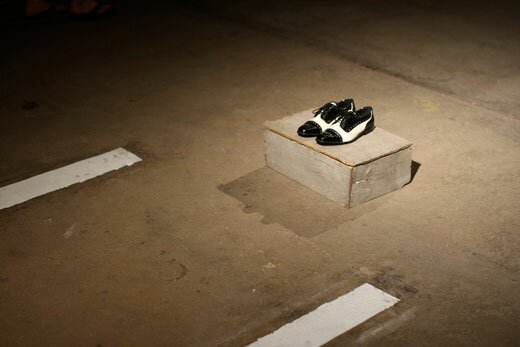
Love in Return (After Anteros)
When we speak of love we begin with the feet. This is dictated by the movement of the heart, but it suggests the movement of the eyes. Of course the mirrors strip us bare even as they sink into the shoes. At what point does the wheel (the base of the leg apparatus) begin to turn? At what point does our fate return to the nest, gilded and headless (armless, legless)? Should I stop here, love, on the white banks of the river? You’ll find your shoes alone. Never. You’ll find your dissolusion in the air. If you reach the top of the ladder then do we find beauty? Yes I’m saying beauty is dissolusion. My heart brings me back to your feet. And yes those mirrors push me straight up your skirt. I’m building your leg straight through your heart. Don’t look away, love.

If at First You Don’t Succeed
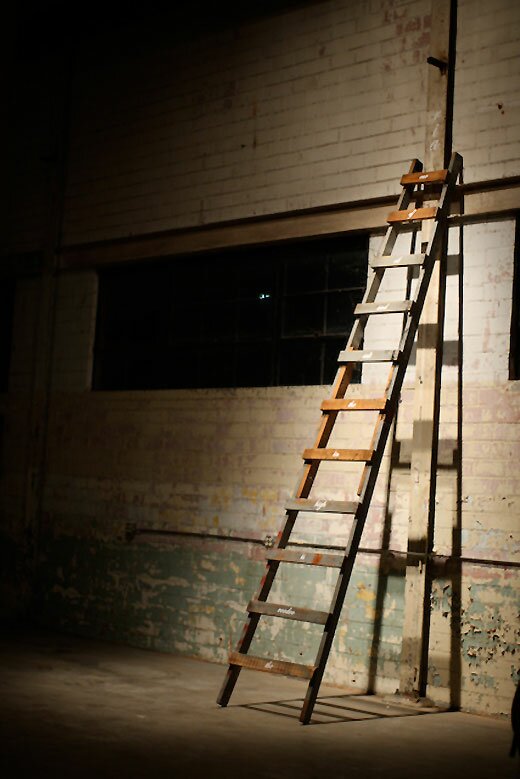
The Voodoo is High in the Salt and the Oil of Our Air
Posted by ben on 10 Nov 2007 | Tagged as: essays, poetry
It’s wonderful that we live in an age in which an essay such as this can exist:
Melancholy and joy are poetry’s modest, binary legacy. Affirmation and repudiation taken together form a somewhat psychotic gesture, the “thumbs up” or “thumbs down” casually borrowed from the Roman caesars (both caesars and poets rely on the thumb). And isn’t poetic melancholy at times only rapture in disguise, as if the poet wished to enjoy inspiration just a bit longer and so hides it in a heat-resistant container? At times these affirmations and negations may be slightly ahistorical, pronounced without reference to new facts and conclusions. The court assembles, experiences inspiration and, ignoring the witnesses, ignoring both the prosecutor and the defense, passes its apodictic, beautifully composed sentence. Is Baudelaire’s complaint really so different from Ovid’s?
Posted by ben on 17 Oct 2007 | Tagged as: poetry, sound art
I’ve had the good fortune to stumble on a couple of great sites in the past couple of days. Sound artist Steve Roden’s blog (”basically a space to share ‘the collection’, much of which serves as inspiration for my work…”), which contains lots of interesting artistic tidbits, including this version of “Listen to the Mockingbird” by Fiddlin “Red” Herron.
And also The Page, a site cataloging links to new poetry, essays about poetry, and some other literary nuggets thrown in for variety. Enjoy.
Posted by ben on 13 Oct 2007 | Tagged as: books, poetry
In the Animal Shelter
Every time you see a beautiful woman, someone is tired of her, so the men say. And I know where they go, these women, with their tired beauty that someone doesn’t want — these women who must live like the high Sierra white pine, there since before the birth of Christ, fed somehow by the alpine wind.
They reach out to the animals, day after day smoothing fur inside the cage, saying, “How is Mama’s baby? Is Mama’s baby lonesome?”
The women leave at the end of the day, stopping to ask an attendant, “Will they go to good homes?” And come back in a day or so, stooping to examine a one-eyed cat, asking, as though they intend to adopt, “How would I introduce a new cat to my dog?”
But there is seldom an adoption; it matters that the women have someone to leave, leaving behind the lovesome creatures who would never leave them, had they once given them their hearts.
— Amy Hempel (from At the Gates of the Animal Kingdom, you should buy )
Posted by ben on 11 Oct 2007 | Tagged as: books, essays, poetry
The history of the infinite circle (no, not that infinite circle), from the Corpus Hermeticum to Borges. Don’t miss the Paul Klee material. (This information will come in handy.)
Posted by ben on 25 Sep 2007 | Tagged as: poetry
Ruin
To Regino Sáinz de la Maza
Never finding itself,
traveling through its own white torso,
the air made its way!
Soon it was clear that the moon
was a horse’s skull,
and the air, a dark apple.
Behind the window,
with whips and lights, I felt
sand struggling with water.
I saw all the blades of grass arrive
and I threw a bleating lamb
to the little teeth and lancets.
The first dove, encased
in feathers and plastic,
flew inside a single drop.
The herd of clouds
stayed asleep, watching
the duel between rocks and dawn.
Here comes the grass, son.
Its spit-swords ring
through the empty sky.
Hold my hand, love. The grass!
Through the house’s broken windows,
the blood unleashed its waves of hair.
Only you and I are left.
Prepare your skeleton for the air.
We’re the only ones who remain.
Prepare your skeleton.
Hurry, love, hurry, we’ve got to look
for our sleepless profile.
— Federico Garcia Lorca (trans. Greg Simon and Steven F. White)
Posted by ben on 17 Aug 2007 | Tagged as: poetry
Enough about money, it’s time for some poetry (the poorest art form around):
Existence
The man of dark politics
in a gold-buttoned boudoir
watched the untying of a black chignon
the hair rolled out like a torrent
in the torrent roses tumbled
and in one rose the mute insect
would not abdicate its existence
and clambered alone slowly
on the trembling petal of the flower
plucked from the ravines of death
in the course of a long day.
– Jean Follain (, trans. W. S. Merwin)
Posted by ben on 31 May 2007 | Tagged as: poetry
Nada no es solamente nada. Es también nuestra cárcel.
Nothing is not only nothing. It is also our prison.
— (trans. W.S. Merwin)
Posted by michelle on 25 May 2007 | Tagged as: books, performance art, poetry
Posted by ben on 22 May 2007 | Tagged as: poetry
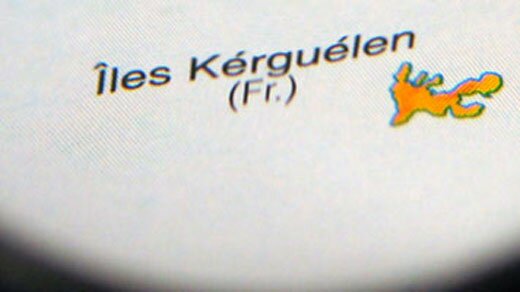
Design Observer gives us Love Letters to Sub-Antarctic Islands.
A little sample:
I know you probably don’t think of me too often. It’s okay. I’m sure you’re occupied with all of those science teams and feral cats. It seems like you’re always surrounded by a hundred other things. Your own little archipelago.
You’re a French possession, but I wish you were mine.
Posted by ben on 07 May 2007 | Tagged as: poetry, responses/reviews
Like all great poets, Li-Young Lee leans sensuality up against philosophy; he achieves intimacy from a distance. Virtually all of his poetry addresses the spaces between us that we are constantly trying to traverse. He deals as much with the space between a husband and wife sleeping next to each other (”am I inside you? he asks, lying between her legs, / confused about his heart, and his body. / If you don’t believe you’re inside me, you’re not / she answers, at peace with the body’s greed, / at peace with the heart’s confusion”) as the space between strangers in a train station (”Your attention please / train number seven, Leaves Blown By, / bound for the color of thinking / and renovated time, is now departing. / All ticketed passengers may board behind my eyes”). Paradoxically, it is by making us aware of these spaces, by drawing us into emptiness, that he is able to achieve that uniquely poetic intimacy.
His languorous reading style, too, is filled with empty spaces, places for breath to settle. When he speaks of Plato’s “Ladder of Love”, you feel that each line in the poem is a rung, bringing us up from the sensual to the spiritual by steps, without ever losing sight of where we began. Yet it is the spaces between the rungs where the movement happens. The rung is merely a place to rest before traversing the chasm between the body and the heart. And so with each line, Lee is merely preparing us for the silence that will follow it, where the breath will settle, where the movement occurs.
When I first saw one of Li-Young Lee’s readings, at Site Santa Fe in 2000, I couldn’t quite appreciate what he was doing; the slow pace led my mind to wander, rather than to dwell in emptiness. On Friday night, thanks to Gemini Ink, I had a chance to see him at the Coates chapel at the Southwest School of Art and Craft. Here I began to feel more fully how the sound of his voice is juxtaposed with silence, how his imagery pushes us to the edges of what we know.
It must be said that the acoustics in the chapel were very poor. It may be that the space does not lend itself to the PA system they had set up, and perhaps amplification muddied the voice. One result of this situation is that at times I gave up on understanding each word, and began to focus on the sounds, the timbre of Lee’s voice, and again, the way his voice plays off of the silence that surrounds it.
The reading lasted about 20 minutes, with six poems in all (”Station“, “To Life”, “Immigrant Blues“, “Hymn to Childhood”, “Trading for Heaven”, and “Virtues of the Boring Husband” (which is “very much autobiographical”)). Following the reading, Rose Catacalos collaborated with Bett Butler and Joël Dilley on jazz settings of Lee’s poetry. This was a combination of Catacalos reciting the work to the music (her reading style reminded me of Laurie Anderson on “Big Science”), and Bett Butler singing the work. My feeling is that the music detracted from the poetry by removing the silences, and by shifting the emotional landscape in a way that is at odds with Lee’s strengths as a poet. The sort of light, carefree jazz that Butler and Dilley tend to play just doesn’t mesh with the gravitas of Lee’s poetry.
So while it is a pleasure to see Li-Young Lee under any circumstance, this reading was not the best of circumstances. But despite these problems, Gemini Ink deserves credit for bringing authors of Lee’s caliber to San Antonio.
Posted by michelle on 28 Apr 2007 | Tagged as: net.art, poetry, possibilities

Seems like the Slovanians are onto something, in the case of a guy named Vuk Cosic and the ASCII Art ensemble, you can watch the opening scene of Psycho or perhaps a poignant scene from the brainy landscape of Eisenstein. These online creations remind me of concrete poetry and text as art or occasionally siphoned of meaning as in Magritte’s hypnogogic endeavors. Catalonian poet and Surrealist, Joan Brossa, left a legacy of visual poetry in various forms such as this:
Posted by ben on 07 Apr 2007 | Tagged as: poetry, responses/reviews

When we meet we know the weeping witness, the wailing waters, the countless victims. They set off in rafts and arrived in bones, behind the veil. Into the blankness our bouquet spilleth. A pleasant day to awaken in the midnight desert (a trickle first, then a river). The kiss of fear warms the wounds of the fearful, welcoming homeward the sibyl of the light drizzle, the thunderous bloom of belief. Approach the watcher with caution. When we meet, we know, on this day (a sea of fire and a shower of blood), the cliff of enduring hope.
[This is a found poem composed of titles of cut paper works by Michael Velliquette. Some of his work is showing at Unit B through Friday, May 4. The image above is The Great Protector (detail).]